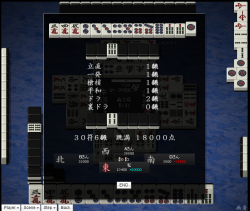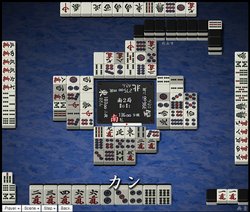Chankan: Difference between revisions
No edit summary |
mNo edit summary |
||
| Line 20: | Line 20: | ||
* The opponent must draw the 4th copy of the ponned tile, then declare a shouminkan (added kan) with it. | * The opponent must draw the 4th copy of the ponned tile, then declare a shouminkan (added kan) with it. | ||
Only shouminkans are vulnerable to chankan (again with one exception) | Only shouminkans are vulnerable to chankan (again with one exception): | ||
*[[Ankan]] (closed kan) cannot be ronned | *[[Ankan]] (closed kan) cannot be ronned. The exception is if a hand is in tenpai for [[kokushi]]. A kokushi hand may call ron on an ankan. Not all rulesets enable this "kokushi chankan on a closed kan" rule, though. | ||
*It is impossible to ron off an [[Kan#Daiminkan|daiminkan]] (open kan). When a tile is discarded, it can either be used for ron, or it can be used to complete the kan. Ron takes precedence over kan, so the player wins before the kan is made. If the ron call is skipped, you cannot retroactively ron after the kan is made. | *It is impossible to ron off an [[Kan#Daiminkan|daiminkan]] (open kan). When a tile is discarded, it can either be used for ron, or it can be used to complete the kan. Ron takes precedence over kan, so the player wins before the kan is made. If the ron call is skipped, you cannot retroactively ron after the kan is made. | ||
| Line 30: | Line 30: | ||
===Machi=== | ===Machi=== | ||
{{main|Machi}} | {{main|Machi}} | ||
As mentioned above, in order to obtain chankan, it is impossible to have a copy of the given winning tile in your hand. Therefore, | As mentioned above, in order to obtain chankan, it is impossible to have a copy of the given winning tile in your hand. Therefore, [[wait]]s involving [[shanpon]] or [[tanki]] are impossible. If you hold a tile in your hand, the opponent cannot make an added kan, making it impossible to chankan with that tile. Therefore, only three of the basic waits are possible: [[penchan]], [[kanchan]], and [[ryanmen]]. These are all waits to complete a [[sequence]]. | ||
In the case for [[kokushi musou]], the hand will be tenpai for kokushi with one of the 13 tile types already paired, and it is waiting for the last tile type for completion. Depending on the ruleset, kokushi may or may not be allowed to win from a closed kan. | |||
In the case for [[kokushi musou]], the hand | |||
===Furiten=== | ===Furiten=== | ||
Revision as of 19:44, 22 August 2024
| Type | Yaku |
|---|---|
| Kanji | 搶槓 |
| English | Robbing a kan |
| Value | 1 han |
| Speed | Dependent |
| Difficulty | Very hard |
Chankan 「搶槓」 is a yaku scored when "robbing a kan". When an opponent upgrades an open triplet into an added kan, you may call ron if the kan would be your winning tile, scoring chankan in the process.
Development

With one exception, in order for chankan to occur:
- You must be in tenpai, waiting on a tile an opponent already called pon for. Any tenpai hand can win with chankan, even if the hand would be "yakuless" otherwise.
- The opponent must draw the 4th copy of the ponned tile, then declare a shouminkan (added kan) with it.
Only shouminkans are vulnerable to chankan (again with one exception):
- Ankan (closed kan) cannot be ronned. The exception is if a hand is in tenpai for kokushi. A kokushi hand may call ron on an ankan. Not all rulesets enable this "kokushi chankan on a closed kan" rule, though.
- It is impossible to ron off an daiminkan (open kan). When a tile is discarded, it can either be used for ron, or it can be used to complete the kan. Ron takes precedence over kan, so the player wins before the kan is made. If the ron call is skipped, you cannot retroactively ron after the kan is made.
Because the opponent must have had possession of all 4 copies of the winning tile, it is impossible for you to have another copy of that tile.
Chankan interrupts the call for kan before it starts. This means that kandora are not revealed after chankan, and chankan denies the opponent's rinshan draw.
Machi
As mentioned above, in order to obtain chankan, it is impossible to have a copy of the given winning tile in your hand. Therefore, waits involving shanpon or tanki are impossible. If you hold a tile in your hand, the opponent cannot make an added kan, making it impossible to chankan with that tile. Therefore, only three of the basic waits are possible: penchan, kanchan, and ryanmen. These are all waits to complete a sequence.
In the case for kokushi musou, the hand will be tenpai for kokushi with one of the 13 tile types already paired, and it is waiting for the last tile type for completion. Depending on the ruleset, kokushi may or may not be allowed to win from a closed kan.
Furiten
Chankan can only happen when a player calls pon. Therefore, there is at least one player who will be in furiten for chankan, and that is the player who was used to complete the original pon call.
Limitation
When a player is in tenpai for suukantsu, some rule variations allow invoking a fifth kan to cause a draw. If a fifth kan is allowed in this way, chankan may not apply - the game ends before a chankan can happen.
Compatibility
^ Ippatsu requires riichi to be of any use.
| RCH | DRI | IPP | SMO | TAN | PFU | IPK | ITT | YAK | SDJ | SDO | TOI | SNA | SNK | CHA | JUN | RPK | SSG | HRO | HON | CHN | CHI | RIN | HAI | HOU | CHK | |
| CHK |
Excluding kokushi musou, chankan requires at least one sequence, because waits to complete a pair (tanki) or triplet (shanpon) would be impossible. This excludes toitoi, chiitoitsu, and honroutou. Ryanpeikou is also not allowed, due to the tile requirement. A ryanpeikou tenpai would require at least one copy of the winning tile, which prevents the other players from calling kan.
As for rinshan, haitei, houtei, and mentsumo, it is physically impossible to combine any of these four with chankan. Rinshan, mentsumo, and haitei require a win by self draw, while chankan is always won with ron. In the case of houtei, a player is not allowed to call kan if there are no tiles left in the live wall, so a chankan cannot be the last discard.
Ippatsu
The ippatsu yaku is normally interrupted by a kan call, and chankan requires an opponent to call kan. However, ippatsu is still not interrupted because the whole kan process has not been completed. The entire kan process includes the kan call itself, plus the rinshan draw and the discard afterwards. The chankan win occurs in the middle of that process, so ippatsu and chankan can be scored together.
Double Riichi
Chankan requires an added kan, which itself requires a pon. This invalidates double riichi for any regular hand:
- If a pon is made before the riichi call, double riichi is negated.
- If the pon call happens after the riichi call, then the double riichi player must have declined their winning tile, invoking furiten. Since chankan can only be won off ron, furiten makes this yaku impossible.
However, an exception exists with kokushi musou. Depending on rule variation, kokushi may be won off a closed kan, which does not require a previous pon call. Therefore, in order to win with double riichi + chankan, it must also have kokushi. Since this would be a yakuman hand, neither double riichi or chankan would actually be scored.
Kokushi musou variation

If the rules allow, a special case for kokushi musou exists. When a kokushi hand is in tenpai, it may win if an opponent calls a closed kan for the tile you are winning for. Thus, ron may be declared, invoking this special rule. This is the only case where a tile may be taken from an closed kan.
However, this particular rule may be subject to variation, which may or may not allow this play to occur.
External links
- Chankan in Japanese Wikipedia
| |||||||||||||||||||||||||||||||
